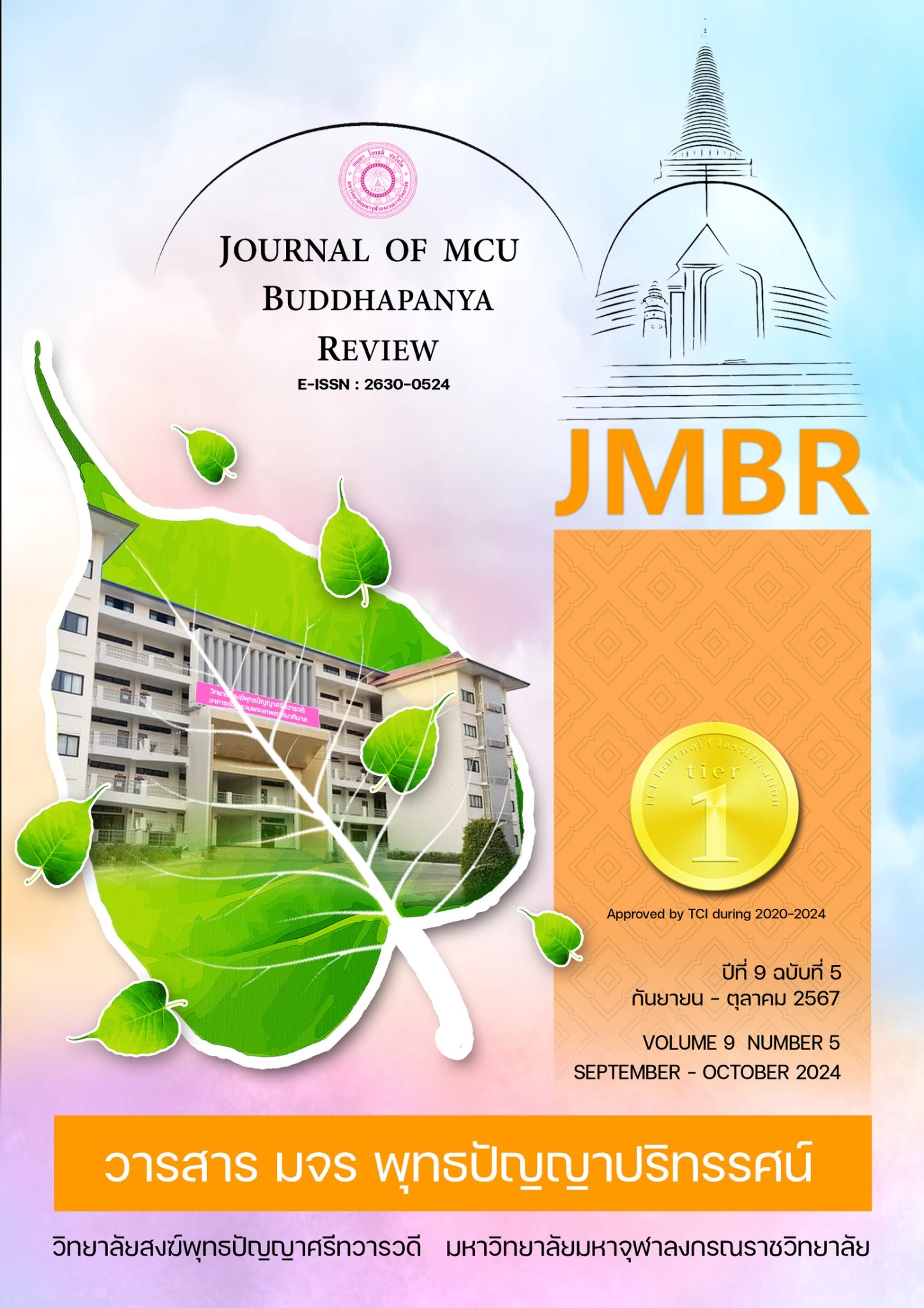THE DEVELOPMENT OF ACTIVE LEARNING MODEL FOR ENHANCING SOCIAL EMOTIONAL LEARNING OF COLLEGE STUDENTS
คำสำคัญ:
Social Emotional Learning, Active Learning Model, College Studentsบทคัดย่อ
This research aimed to evaluate the effectiveness of an active learning model for enhancing college students' social-emotional learning. The samples were first-year undergraduates majoring in Preschool Education at the School of Education, from Guangdong Baiyun University. In this study, the research instruments were social emotional learning questionnaires with total reliability of 0.96 and an active learning model for enhancing social emotional learning. An active learning model consisted of 14 lessons, with each lesson's activities based on three steps: 1) Lead-In 2) Learning Activities Process and 3) Conclusion. Each lesson lasted for 90 minutes and the activity was conducted for a total of 6 weeks. Statistical methods such as mean, standard deviation (SD), one-way and two-way repeated ANOVA analysis were used to analyze the data. Based on voluntary student participation, 40 students became the samples of this study. These samples were randomized to the experimental group and the control group equally. The experimental group (n=20) received an active learning model for enhancing social emotional learning, but the control group was not. The research results showed that an active learning model was effective in enhancing college students' social emotional learning, and the experimental group continued to show improvement at one-month follow-up as follows: 1) college students’ social emotional learning after receiving an active learning model and after the follow up period was significantly higher than before beginning the experiment at a level of .05 and 2) college students’ social emotional learning after receiving an active learning model and after the follow up period was significantly higher than those in the control group at a level of .05. Therefore, it can be concluded that an active learning model is effective in enhancing social emotional learning in college students.
เอกสารอ้างอิง
Bonwell, C. C., & Eison, J. A. (1991). Active learning: Creating excitement in the classroom. 1991 ASHE-ERIC higher education reports. ERIC Clearinghouse on Higher Education, The George Washington University, One Dupont Circle, Suite 630, Washington, DC 20036-1183.
CASEL. (2022). Fundamentals of SEL. CASEL. https://casel.org/fundamentals-of-sel/
Chernyshenko, O. S., Kankaraš, M., & Drasgow, F. (2018). Social and emotional skills for student success and well-being: Conceptual framework for the OECD study on social and emotional skills.
Collins, J. W., & O’Brien, N. P. (2011). The greenwood dictionary of education. University of Illinois Urbana-Champaign.
De Houwer, J., Barnes-Holmes, D., & Moors, A. (2013). What is learning? On the nature and merits of a functional definition of learning. Psychonomic bulletin & review, 20, 631-642.
Durlak, J. A., Weissberg, R. P., Dymnicki, A. B., Taylor, R. D., & Schellinger, K. B. (2011). The impact of enhancing students’ social and emotional learning: A meta‐analysis of school‐based universal interventions. Child development, 82(1), 405-432.Felder, R. M., & Brent, R. (2009). Active learning: An introduction. ASQ Higher Education Brief, 2(4), 1-5.
Felder, R. M., & Brent, R. (2009). Active learning: An introduction. ASQ higher education brief, 2(4), 1-5.
Fink,D.(2013b).Active learning. commons.trincoll.edu. https://commons.trincoll.edu/ctl/files/
Freeman, S., Eddy, S. L., McDonough, M., Smith, M. K., Okoroafor, N., Jordt, H., & Wenderoth, M. P. (2014). Active learning increases student performance in science, engineering, and mathematics. Proceedings of the national academy of sciences, 111(23), 8410-8415.
Greenberg, M. T., Weissberg, R. P., O'Brien, M. U., Zins, J. E., Fredericks, L., Resnik, H., & Elias, M. J. (2003). Enhancing school-based prevention and youth development through coordinated social, emotional, and academic learning. American psychologist, 58(6-7), 466.
Handelsman, J., Miller, S., & Pfund, C. (2007). Scientific teaching. Macmillan.
Lave, J. (2009). The practice of learning. In Contemporary theories of learning (pp. 208-216). Routledge.
Li, L., & Wang, J. (2017). The investigation analysis of the current situation and education of the college students’ emotional intelligence. CNKI. https://kns.cnki.net/KCMS/detail/detail.aspx?dbcode=CJFD&dbname=CJFDLAST2017&filename=JZYK201703039&uniplatform=OVERSEA&v=JZ5ZQl1RohbBUDXmYCzZKBbCZphtBHRR2FOozs5cPLghdLL1kTqMASQ1A2y21wDz
Liu, H. (2023). The relationship between college students' family environment, adult attachment, and interpersonal relationships. Advances in Social Sciences, 12, 3327.
Lu, J.-M., Chen, N.-Q., Xu, L., Chen, Y.-Z., Wu, J., Wang, R., ... & Li, X.-J. (2016). A survey of emotional intelligence among contemporary Chinese college students. Psychological Science, 39(6), 1302.
Mizokami, S. (2017). Deep Active Learning: Toward Greater Depth in University Education.
Oberle, E., Schonert-Reichl, K. A., Hertzman, C., & Zumbo, B. D. (2014). Social–emotional competencies make the grade: Predicting academic success in early adolescence. Journal of Applied Developmental Psychology, 35(3), 138-147.
OECD (2021), Beyond Academic Learning: First Results from the Survey of Social and Emotional Skills, OECD Publishing, Paris, https://doi.org/10.1787/92a11084-en.
Osher, D., Kidron, Y., Brackett, M., Dymnicki, A., Jones, S., & Weissberg, R. P. (2016). Advancing the science and practice of social and emotional learning: Looking back and moving forward. Review of Research in Education, 40(1), 644-681.
Vanhorn, S., Ward, S. M., Weismann, K. M., Crandall, H., Reule, J., & Leonard, R. (2019). Exploring active learning theories, practices, and contexts. Communication research trends, 38(3).
Wu, C., Zhang, L., & Wang, L. (2021). Emotional intelligence education for college students: Current situation, reasons and countermeasures. Modern Commerce and Industry, 42(33), 3.
Yu, G. (2022). The detection rate of mental health issues among Chinese students and its educational implications. Tsinghua University Journal of Education Research, 43(4), 20-32.
Zins, J. E., & Elias, M. J. (2007). Social and emotional learning: Promoting the development of all students. Journal of Educational and Psychological consultation, 17(2-3), 233-255.
Zins, J. E., Walberg, H. J., & Weissberg, R. P. (2004). Getting to the heart of school reform: Social and emotional learning for school success. NASP Communique, 33(3), 35.
ดาวน์โหลด
เผยแพร่แล้ว
รูปแบบการอ้างอิง
ฉบับ
ประเภทบทความ
สัญญาอนุญาต
ลิขสิทธิ์ (c) 2025 วารสาร มจร พุทธปัญญาปริทรรศน์

อนุญาตภายใต้เงื่อนไข Creative Commons Attribution-NonCommercial-NoDerivatives 4.0 International License.



